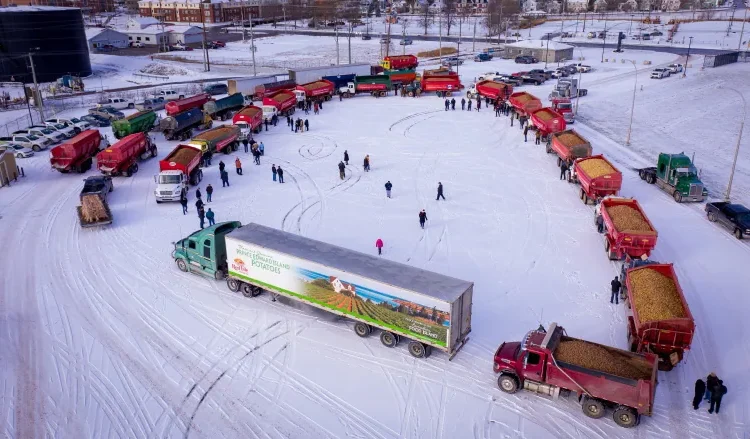Potato board chair concerned about growing emotional toll export ban is having on Island farm families
Sixteen trucks loaded with half a million pounds of potatoes rolled through the streets of Charlottetown Monday, carrying with them a message to the federal government: reopen the border.
Banners on the side of the trucks described the impact of the ban on the export of fresh P.E.I. potatoes to the United States — a loss of $330,000 a day — amid a growing backlog of potatoes that may have to be destroyed.
The convoy included about 40 trucks of all shapes and sizes, many from the agricultural sector, showing their support for Island growers.
The Canadian Food Inspection Agency (CFIA) suspended trade in fresh potatoes to the U.S. on Nov. 21. The move was in response to American concerns about the discovery of potato wart in two P.E.I. fields in October.
Three members from the Hayden family farm in Pownal, P.E.I., were driving potato trucks in the convoy. Two of them are seventh-generation potato farmers.
“It was touching to see the support from the people we drove by on the sidewalks. They seemed to be waving and supportive to us, and their horns were all blasting on the trucks too,” said Harrison Hayden.
“It felt good to feel like the people on P.E.I. are supporting us, and we’re very grateful for that,” said Jason Hayden, a former chair of the P.E.I. Potato Board.
“We need to get our message sent to Ottawa that this has to be resolved. They’re the people that have the power to fix this.”

The Potato Board says the export ban has blocked the sale of more than 12 million kilograms — or 27 million pounds of potatoes — so far, a loss of more than $11 million to the Island economy.
Josh Hayden said what was once shaping up to be a good year has turned “bleak.”
“We had to lay off a few crew, and a lot of our very expensive packaging equipment is just sitting there idle,” he said.
“We’re not ordering packaging or keeping truckers busy. Everything’s just quiet. It’s kind of eerie.”

For the Haydens — as for many Island growers — the longer the U.S. border remains closed, the more potatoes they won’t be able to sell, which may need to be destroyed.
“You go to bed thinking about it, and you wake up thinking about it, the uncertainty of it,” Jason Hayden said.
“You just don’t know, and you can’t make any plans going into the spring at this point in time.”

Jason Hayden remembers the winter of 2001, when the first discovery of potato wart closed the U.S. border, and more than 300 million pounds of potatoes were destroyed.
“We’re going into January facing the prospect of dumping millions and millions of pounds of potatoes,” Jason Hayden said.
“I remember doing that years ago. My sons don’t. But it’s not something we’re looking forward to.”

John Visser, co-owner of Victoria Potato Farm and P.E.I. Potato Board chair, said a help line for farmers is taking more calls.
“There’s despair. It’s taking an emotional toll, and that’s being shown on the farmers help line,” he said.
“The numbers are up. It’s taking a major toll on an all farmers and their families.”


